Is the Universe fine-tuned for discoverability?
-
Question
Of all the known ways that a life-permitting universes could have been, is it true that few have initial conditions, laws, and physical constants which would ever allow its potential lifeforms to cooperatively engage in science, probing it's deep truths, and to learn about it?
-
Experts say "yes"
American Mathematical Society (D. Khavinson, G. Neumann): “The ‘unreasonable effectiveness of mathematics’ is well known throughout the sciences, but every new instance produces welcome insights and sheer delight.” [Where mathematics and astrophysics meet (June 2008), available online.]
-
Relevance to theism: it's surprising on atheism
Learning of the Universe's discoverability is a uniquely awkward and shocking development for atheists
- Albert Einstein: “You may find it strange that I consider the comprehensibility of the world to the degree that we may speak of such comprehensibility as a miracle or an eternal mystery. Well, a priori one should expect a chaotic world, which cannot be in any way grasped through thought... The kind of order created, for example, by Newton's theory of gravity is of quite a different kind. Even if the axioms of the theory are posited by a human being, the success of such an enterprise presupposes an order in the objective world of a high degree, which one has no a priori right to expect. That is the miracle which grows increasingly persuasive with the increasing development of knowledge.” [1956, A Letter to Maurice Solovine]
- Eugene Wigner (Nobel Prize winner, theoretical physicist): “The miracle of the appropriateness of the language of mathematics for the formulation of the laws of physics is a wonderful gift which we neither understand nor deserve. We should be grateful for it and hope that it will remain valid in future research and that it will extend, for better or for worse, to our pleasure, even though perhaps also to our bafflement, to wide branches of learning.” [The Unreasonable Effectiveness of Mathematics in the Physical Sciences (1960), 14.]
- Paul Davies (Agnostic turned deist, physics professor at Cambridge, etc.): “A common reaction among physicists to remarkable discoveries… is a mixture of delight at the subtlety and elegance of nature, and of stupefaction: ‘I would never have thought of doing it that way.’ If nature is so ‘clever’ it can exploit mechanisms that amaze us with their ingenuity, is that not persuasive evidence for the existence of intelligent design behind the physical universe? If the world's finest minds can unravel only with difficulty the deeper workings of nature, how could it be supposed that those workings are merely a mindless accident, a product of blind chance? … Uncovering the laws of physics resembles completing a crossword in a number of ways. In the case of the crossword, it would never occur to us to suppose that the words just happen to fall into a consistent interlocking pattern by accident.” [Superforce: The Search for the Grand Unified Theory of Nature (New York: Simon and Schuster, 1984), 235-36)]. Also: “It is impossible to be a scientist working at the frontier without being awed by the elegance, ingenuity, and harmony of the lawlike order in nature. In my attempts to popularize science, I am driven by the desire to share my own sense of excitement and awe with the wider community; I want to tell people the good news. The fact that we are able to do science, that we can comprehend the hidden laws of nature, I regard as a gift of immense significance.” [“Physics and the Mind of God”, Templeton Prize address: Online]
-
Relevance to theism: it's not surprising on theism
On theism, humanity was designed in God’s image, to be “knowers with power” as He is--His viceroys and stewards in the universe. We were designed with a proper thirst for knowledge about a user-friendly natural order that this perfectly rational God put in place for us to work with. It's not unlikely on theism that the natural order would be intelligible to man. This is in large part why mathematical-experimental science uniquely formed from Christian soil rather than any other culture. So the intelligibility and discoverability of the universe fits better on theism than on naturalism.
- Paul Davies (Agnostic turned deist, physics professor at Cambridge, etc.): “People take it for granted that the physical world is both ordered and intelligible. The underlying order in nature-the laws of physics-are simply accepted as given, as brute facts. Nobody asks where they come from; at least they do not do so in polite company. However, even the most atheistic scientist accepts as an act of faith that the universe is not absurd, that there is rational basis to physical existence manifested as law-like order in nature that is at least part comprehensible to us. So science can proceed only if the scientist adopts an essentially theological worldview.” [“Physics and the Mind of God”, Templeton Prize address: Online]
- D. Halsmer, J. Asper, N. Roman, T. Todd: “Human-engineered systems are characterized by stability, predictability, reliability, transparency, controllability, efficiency, and (ideally) optimality. These features are also prevalent throughout the natural systems that make up the cosmos. However, the level of engineering appears to be far above and beyond, or transcendent of, current human capabilities. Even so, there is a curious match between the comprehensibility of the universe and the ability of mankind to comprehend it. This unexplained matching is a prerequisite for any kind of reverse engineering activity to be even remotely successful. And yet, mankind seems to be drawn onward toward a potential wisdom, almost in tutorial fashion, by the puzzles of nature that are continually available for us to unravel. Indeed, the universe is so readily and profitably reverse engineered as to make a compelling argument that it was engineered in the first place, apparently with humanity in mind.” [“The Coherence of an Engineered World”, International Journal of Design & Nature and Ecodynamics, Vol. 4(1)(2009): 47.]
- Albert Einstein: “I have found no better expression than ‘religious’ for confidence in the rational nature of reality, insofar as it is accessible to human reason.” [Letter to Maurice Solovine, (1 January 1951) [Einstein Archive 21-174]; published in Letters to Solovine (1993)]
- Robin Collins (Philosopher-physicist at Messiah College): “The heart of the theistic alternative is to explain the fact that our universe exhibits BSC by claiming that (i) a universe exhibiting BSC will realize both moral and aesthetic values to a greater degree than universes not exhibiting BSC and (ii) God would have some reason to bring about a universe structure to realize these values. … In the theistic explanation, the claim that God provides a non-ad-hoc connecting link between value and existence is based on a natural extrapolation from our own experience that once grasped, the goodness or beauty of a state of affairs gives us ― and presumably any conscious agent ― a reason to prefer that state of affairs. The idea is that part of grasping that a state of affairs has value ― whether moral or aesthetic ― is to "feel" the desirability of the state, and hence have some motivation to bring it about. … Whether one buys this sort of argument or not, I think that at minimum one has to admit that it is in no way arbitrary or ad-hoc to hold that a perfectly free, omniscient, and omnipotent being would have the desire to bring about states of goodness and beauty.” [The Fine Tuning for Discoverability DRAFT (2014), 18. Avaliable online.]
-
[All forthcoming] See paper inside
A great source of information for this argument can be found online here.
-
Laws of nature are elegant in general
This fact is often recognized by specialists.1 There are multiple ways to make the point, but consider one way as argued for here by philosopher-physicist Robin Collins:
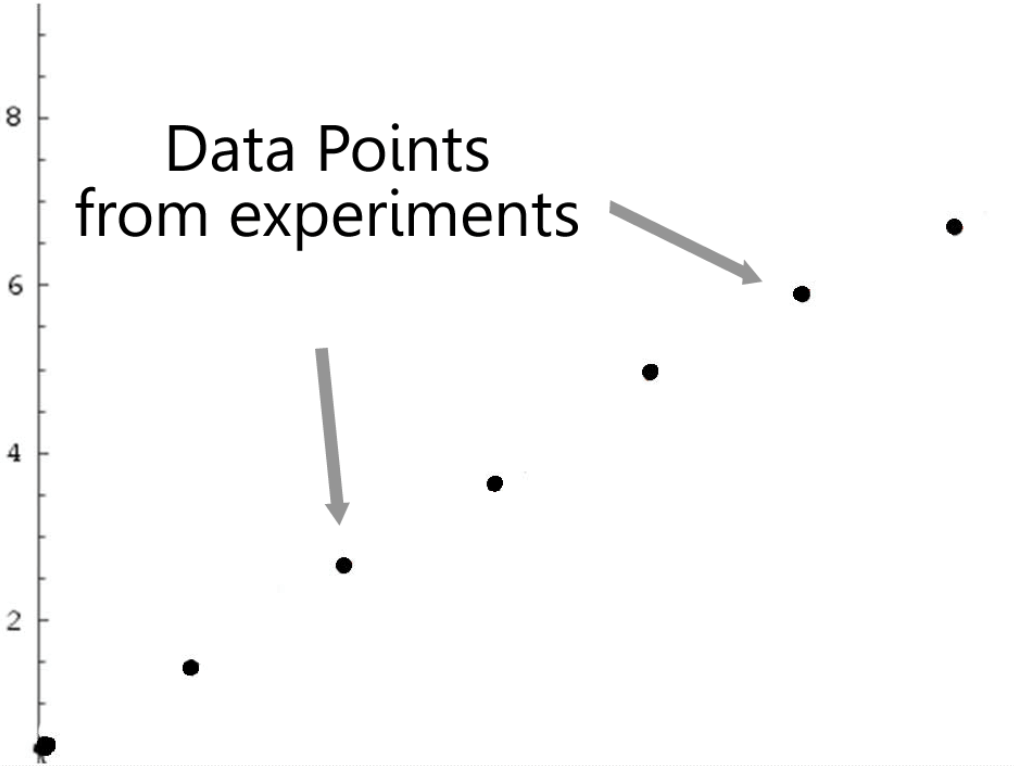 When scientists investigate and measure how things work in the world, they accumulate “data points,” like these, and they look to discern patterns in nature and thereby discover the natural laws which can be used for future predictions.
When scientists investigate and measure how things work in the world, they accumulate “data points,” like these, and they look to discern patterns in nature and thereby discover the natural laws which can be used for future predictions.
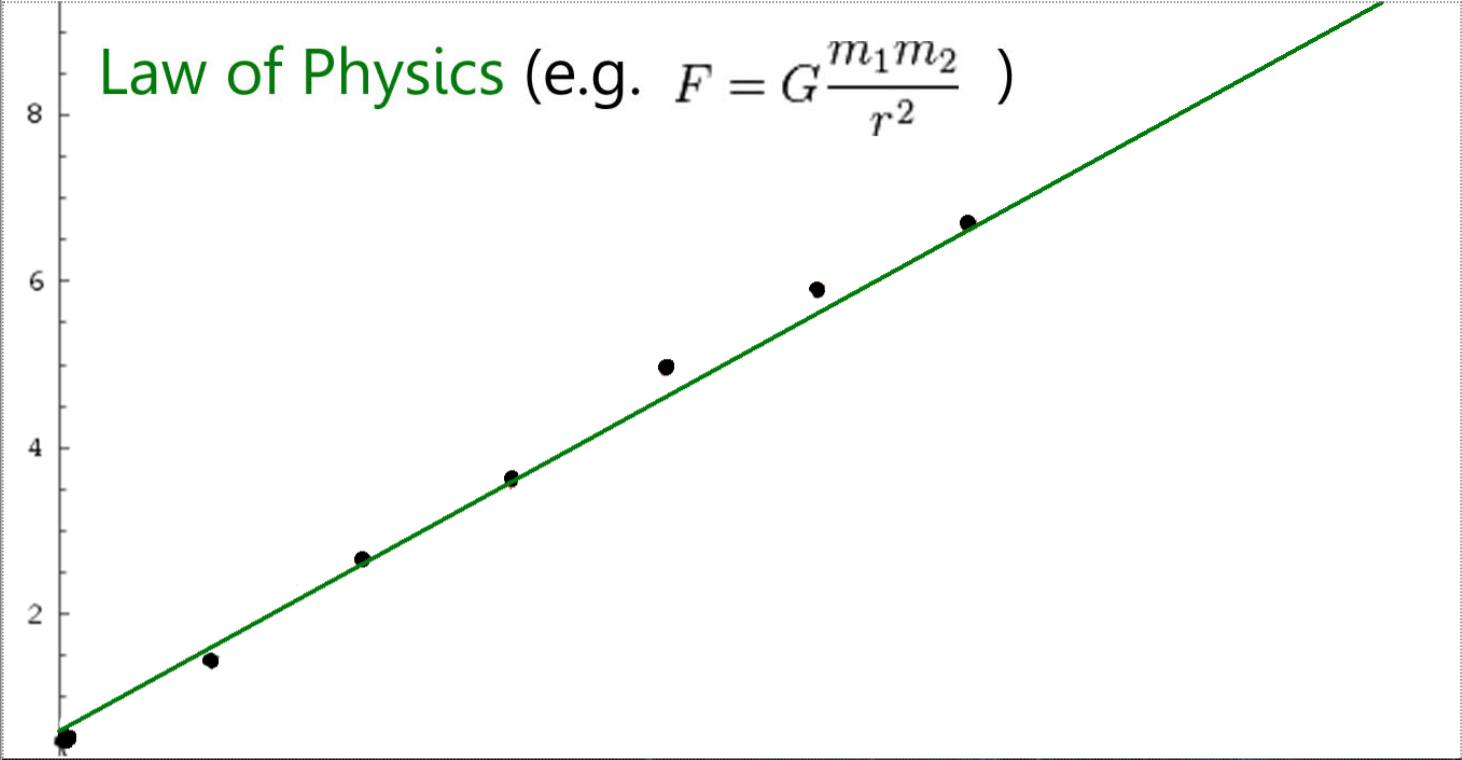
We can represent the simplified example pattern by this simple purple line which will be described by a simple mathematical function (those equation-like things we all had to learn in physics class).
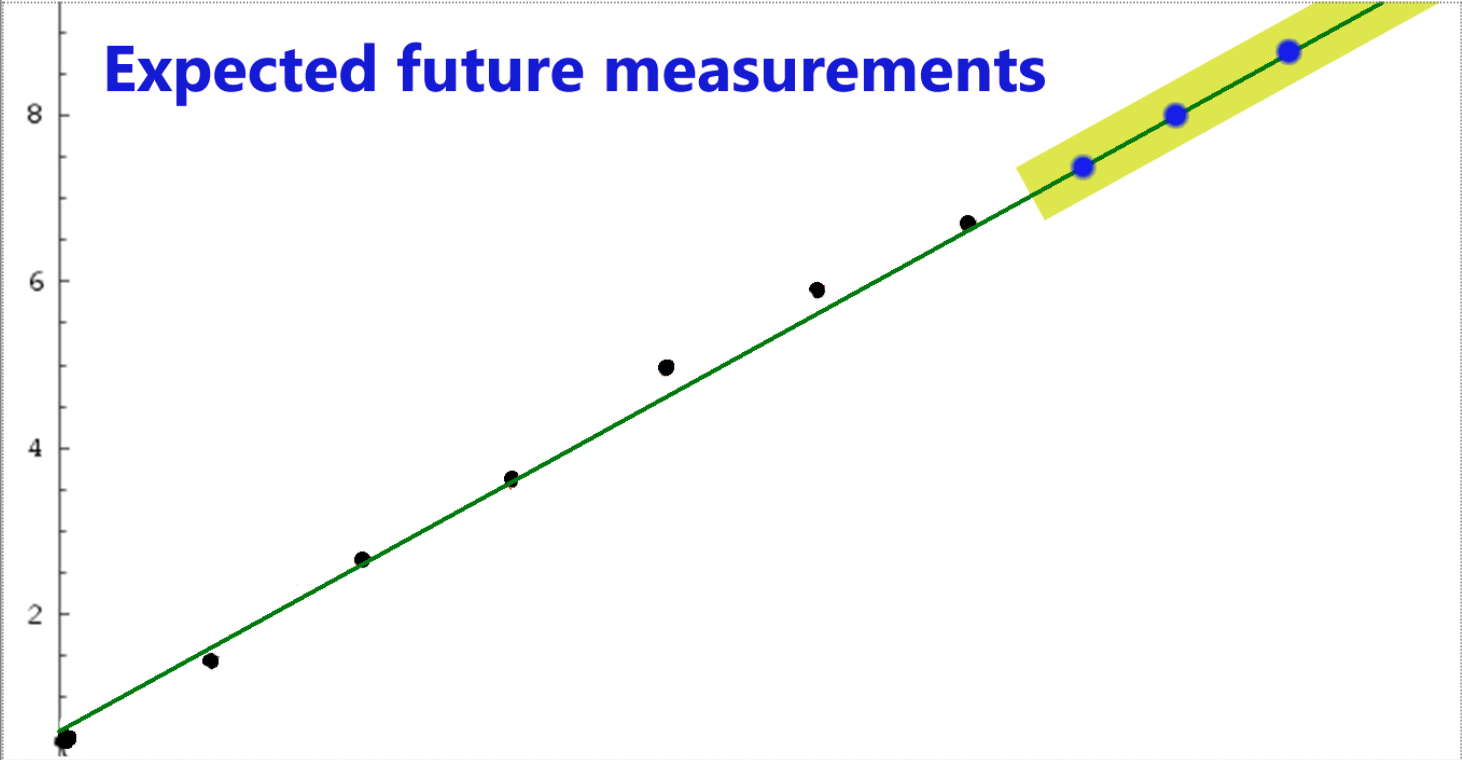
And if you’ll look at these three new highlighted dots, this simple functional law has allowed us to extrapolate from the past or examined data to make predictions about future or unexamined data.
But here is the problem for naturalism: this whole endeavor requires the all-important assumption that the laws of nature are simple and elegant. For example: deficiencies in our measuring instruments, make it normal for the functional line to not precisely go through every data point, even though those points are our measurements.
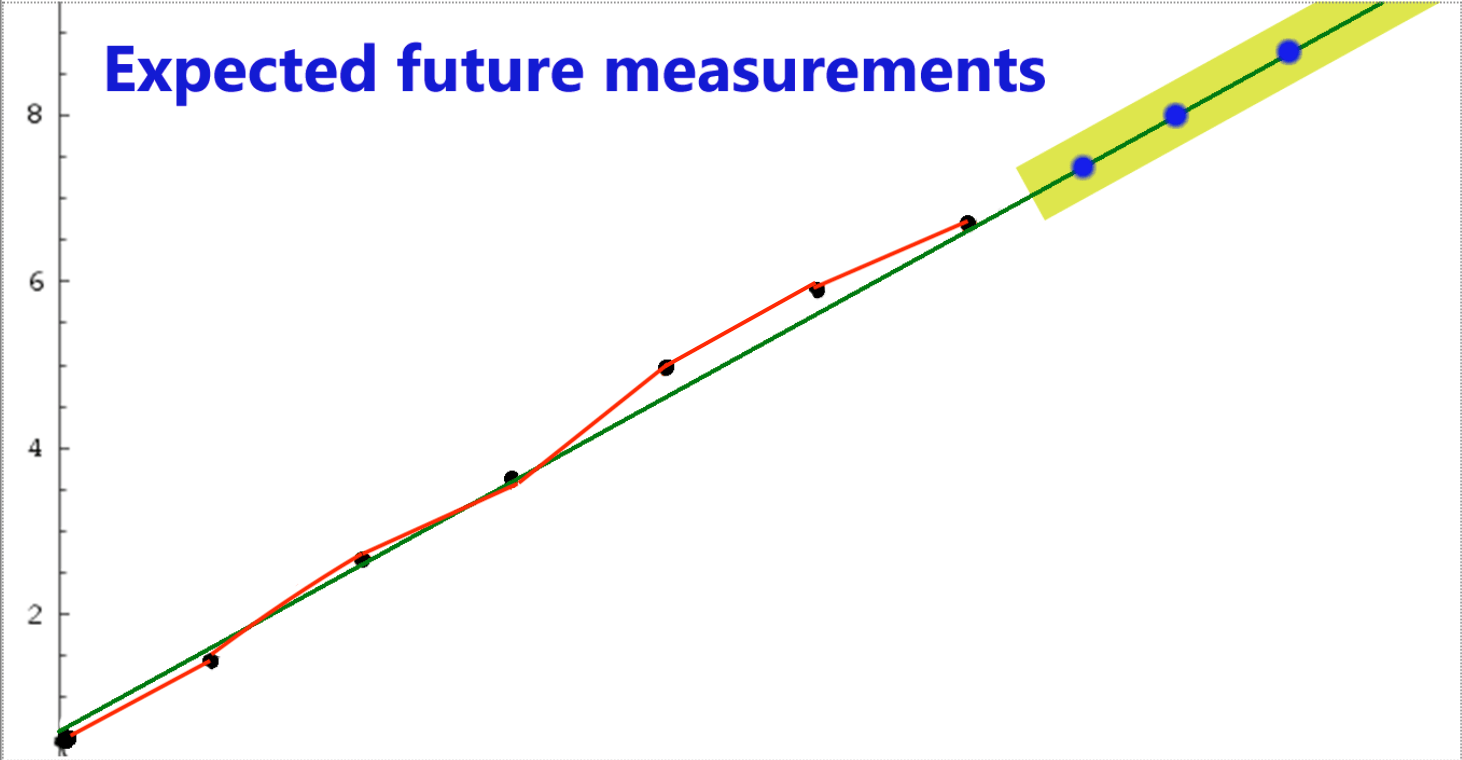 Since that’s what we measure, technically, an ugly complex law, like this blue function, fits our data better. But naturalists won’t accept the blue line, because they go in expecting simplicity and elegance in nature. Like the purple law.
Since that’s what we measure, technically, an ugly complex law, like this blue function, fits our data better. But naturalists won’t accept the blue line, because they go in expecting simplicity and elegance in nature. Like the purple law.- Steven Weinberg (Nobel Laureate in high energy physics): “I have to admit that sometimes nature seems more beautiful than strictly necessary.” [Dreams of a Final Theory (Vintage, 1994), 250.]
- Paul Davies: "Let us accept, then, that nature really is ordered in a mathematical way that 'the book of nature,' as Galileo said, 'is written in mathematical language.' Even so, it is easy to imagine an ordered universe that nevertheless remains utterly beyond human comprehension, due to its complexity and subtlety. For me, the magic of science is that we can understand at least part of nature-perhaps in principle all of it-using the scientific method of enquiry. It is utterly astonishing that we human beings can do this-why should the rules on which the universe runs be accessible to humans? The mystery is all the greater when one takes into account the cryptic character of the laws of nature. When Newton saw the apple fall, he saw a falling apple. He did not see a set of differential equations that link the motion of the apple to the motion of the moon. The mathematical laws that underlie physical phenomena are not apparent to us through direct observation; they have to be painstakingly extracted from nature using arcane procedures of laboratory experiment and mathematical theory. The laws of nature are hidden from us, and are revealed only after much labor. The late Heinz Pagels-another atheistic physicist- described this by saying that the laws of nature are written in a sort of cosmic code, and that the job of the scientist is to crack the code and reveal the message-nature's message, God's message, take your choice, but not our message. The extraordinary thing is that human beings have evolved such a fantastic code-breaking talent. This is the wonder and the magnificence of science: we can use it to decode nature and discover the secret laws the universe follows." ["Physics and the Mind of God", Templeton prize address: Online
-
Laws of nature are time-elegant
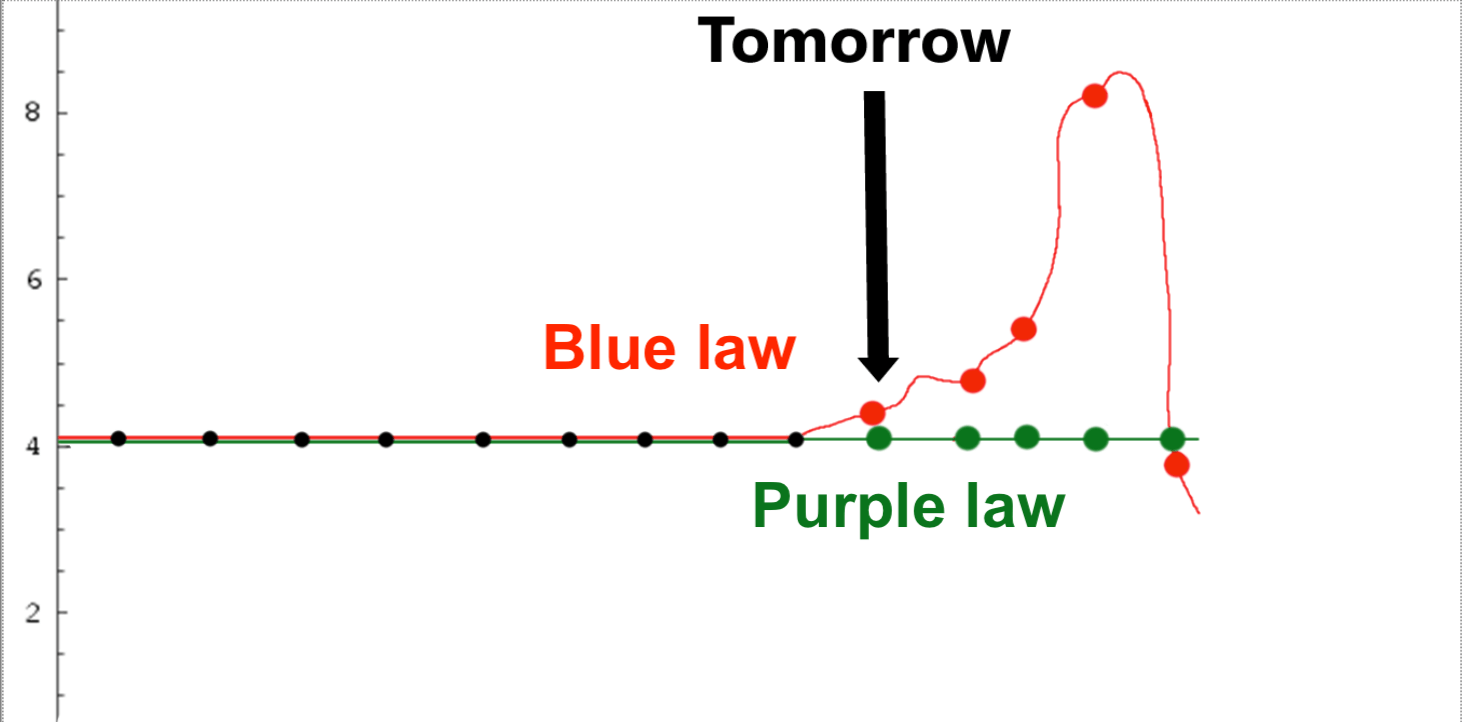 In a similar vein to the argument above, imagine setting the Y-Axis as the value of the gravitational constant, and the X-Axis as time. If the law describing gravity is simple, then the constant will remain. . . constant (as predicted by the purple law). But it does not have to be simple. If the strength of the constant changed tomorrow, again, all that would mean is that the law governing gravity is a more like a complex blue law.
In a similar vein to the argument above, imagine setting the Y-Axis as the value of the gravitational constant, and the X-Axis as time. If the law describing gravity is simple, then the constant will remain. . . constant (as predicted by the purple law). But it does not have to be simple. If the strength of the constant changed tomorrow, again, all that would mean is that the law governing gravity is a more like a complex blue law.
-
The age of the universe is fine-tuned for discovery
Regardless of technology, as the expansion of the universe continues to accelerate the distant objects currently observable (carried by light) will start disappearing from view (as we start diverging faster than light). So if we arrived here any later in cosmic history, we would have a sub-optimal view of the universe (obviously if we had arrived earlier the universe would have been smaller with much less to see).
Scientific American '08: We are led inexorably to a very strange conclusion. The window during which intelligent observers can deduce the true nature of our expanding universe might be very short indeed. [Lawrence Krauss, The End of Cosmology? An accelerating universe wipes out traces of its own origins (2008)]
-
Observing the Universe
- Most all planets do not allow observation of the Universe. They are contained in spiral arms and are faced with walls of interstellar debri.
- We reside between the Sagittarius and Perseus spiral arms. ... our location within the Galactic Habitable Zone offers the best overall location to be a successful astronomer and cosmologist. Even though we’re near the mid-plane, there’s very little in the way of dust in our neighborhood to absorb light from nearby stars and distant galaxies. We’re far enough from the Galactic center and the disk is flat enough that it doesn’t excessively obscure our view of the distant universe. We have access to a striking diversity of nearby stars and other Galactic structures, as well as a clear view of distant galaxies and the unique cosmic microwave background radiation, both essential for discovering the astonishing facts that the universe is expanding and finite in age.